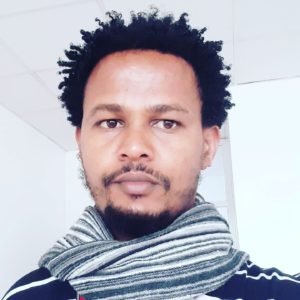Registration is Closed
Oct.8th 11:59pmCST
- Afaan Oromoo class I: Listening, Reading, Speaking and Writing
- Earn a Certificate upon completion
- Beginner/Foundational Level
- 100% online courses
This is a 4week online course is designed to train learners online with basic skills of Afaan Oromoo. Students will be trained with the four basic language skills: speaking, reading, writing and listening/understanding Afaan Oromoo. It will start with alphabets (Qubee Afaan Oromoo) and phonetics. You will also be learning word constructions and their meanings. This is for: All Oromo and non-Oromo people
Instructor’s contribution in Afaan Oromoo development

Mr. Yosef Hamba Tola has written two short books in Afaan Oromoo: (1) ‘Dungoo Oromoo’ (published) which presents stories about Oromo struggle fighters; (2) ‘Madaa Qorsa Dhabe’ (unpublished) which presents about Oromo struggle and its aftermath in fiction form. He has been initiating and participating in Facebook translation to Afaan Oromoo along with his Oromo colleagues. He published more than 7K words and reviewed more than 10K words in Facebook translation to Afaan Oromoo.
Mr. Yosef has also been publishing some articles in Afaan Oromo, for instance on Gullallee Post and Gibe Tube. His birthplace, primary and secondary education background are core basis for his aforementioned contribution in Afaan Oromo development. Mr. Yosef Hamba Tola was born in a village called Billee (in Dogano) at Lalo Kile district of Kellem Wollaga zone, Oromia, Ethiopia. Mr. Yosef completed his primary education at Lalo Kile Primary school where Afaan Oromoo is medium of instruction and he attended Afaan Oromoo courses during his high school studies (Grade 9 -12) at Lalo Aira Secondary School (LASS), which found at Aira district of West Wollaga zone. Mr. Yosef holds a B.Sc. from Dire Dawa University (Ethiopia), M.Sc. from PAUSTI-JKUAT (Kenya) and a PhD candidate at the University of Pretoria (South Africa) since 2017.
Weekly Schedule
- Week 1: “Qubee Afaan Oromoo (A-Z, Qubee Dachaa)” – Consonant and vowel letters
- Mode of delivery: Lecture, Class work and Assignment -1
- Week 2: “Sagalee uumuu (Sagalee gabaabaafi dheeraa)” – Phonetics
- Mode of delivery: Lecture, Class work and Assignment -2
- Week 3: “Jechoota uumuufi waamuu” – word construction and reading
- Mode of delivery: Lecture, Class work and Assignment -3
- Week 4: Hiika jechootaa – Dictionary and Final Exam
- Mode of delivery: Lecture, Class work and Assignment -4
- Final Exam (assessment will be from Week 1 to 4).
Important tips
- Main areas for Afaan Oromoo class I: Listening, Reading, Speaking and Writing.
- All the homeworks and assignments should be submitted to the instructor via email before the next class: Email: ytola@ollaa.org and Cc to info@ollaa.org
- Certificate of completion will be issued by OLLAA for Afaan Oromoo class I.
Introduction To Class
‘Afaan Oromoo’ is an Afroasiatic language belonging to the Cushitic branch. It is spoken predominantly by the Oromo people and neighboring ethnic groups in the Horn of Africa. About 85% of Oromo speakers live in Ethiopia, mainly in Oromia region. It is the most widely spoken language in Ethiopia. It is also the most widely spoken Cushitic language and the fourth-most widely spoken language of Africa, after Arabic, Hausa and Swahili. It is spoken as a first language by more than 40 million Oromo people in Ethiopia and by an additional more than half-million in parts of northern and eastern Kenya. It is also spoken by smaller numbers of emigrants in other African countries such as South Africa, Uganda, Libya, Egypt, Sudan and Tanzania. Besides first language speakers, significant members of other ethnicities who are in contact with the Oromo speak it as a second language, for instance, the Omotic-speaking Bambassi and the Nilo-Saharan-speaking Kwama in northwestern Oromia. Afaan Oromoo serves as the official working language of the Oromia, Harar and Dire Dawa regional states and of the Oromia Zone in the Amhara Region. It is a language of primary education in Oromia, Harar, Dire Dawa, Benishangul-Gumuz and Addis Ababa and of the Oromia Zone in the Amhara region.
The purpose of Learning Afaan Oromoo: Why is it important?
This course is designed to train learners online with basic skills of Afaan Oromoo. In fact, every language affects the day to day activities of everyone in the world. Language is an instrument of communication, and helps to express our feelings, desires, and demands to the world around us. Nowadays, there is a greatest need to communicate in multiple languages in the increasingly integrated global business community. It is haughty to believe that one can travel the world and expect all of mankind to understand his or her mother tongue or local dialect. While travelling the world, whether for business or pleasure, a desire and willingness to adapt to new cultures and methods is necessary. Such adaptability obviously starts with the ability to communicate with new people in various dialects, preferably in their own language. It is very difficult to adapt and get along with new people if there is no way to communicate with one another. By the same token, learning Afaan Oromoo will help you to easily communicate and integrate with the giant nation of Africa – Oromo people. In this course, students will be trained with the four basic language skills: speaking, reading, writing and listening/understanding Afaan Oromoo. It will start with alphabets (Qubee Afaan Oromoo) and phonetics. We will also teach you word constructions and their meanings. By so doing, we will introduce you to the central theme of our mission, which has two fold:
1. We teach Afaan Oromoo to share Oromo culture
We can share our love of Oromo culture through language teaching. Often, the only way to explore the Oromo condition as represented in a foreign place is through reading that culture’s literature, examining its history and actually studying the culture. This all allows an examination of how Oromo nation approach moral dilemmas and other difficult situations. It might take a long time to discover this through traditional language study alone, but we can help our students by teaching culture, even a little, from the earliest days onward. Without this cultural knowledge, our students might understand the words that someone says, but they might not always understand the ideas behind them.
2. We teach Afaan Oromoo to help our students learn about the ‘self’ by learning about the other
Afaan Oromoo teaching is a key component of helping our students further grow and develop their identity. For non-Oromos in particular, in learning your first language, you learned about the culture in which you grew up. In studying Afaan Oromoo, you learn about Oromo culture in comparison with your own. This is an additional level of instruction that we provide our students: We teach you to learn about yourselves through the eyes of Oromo culture.


